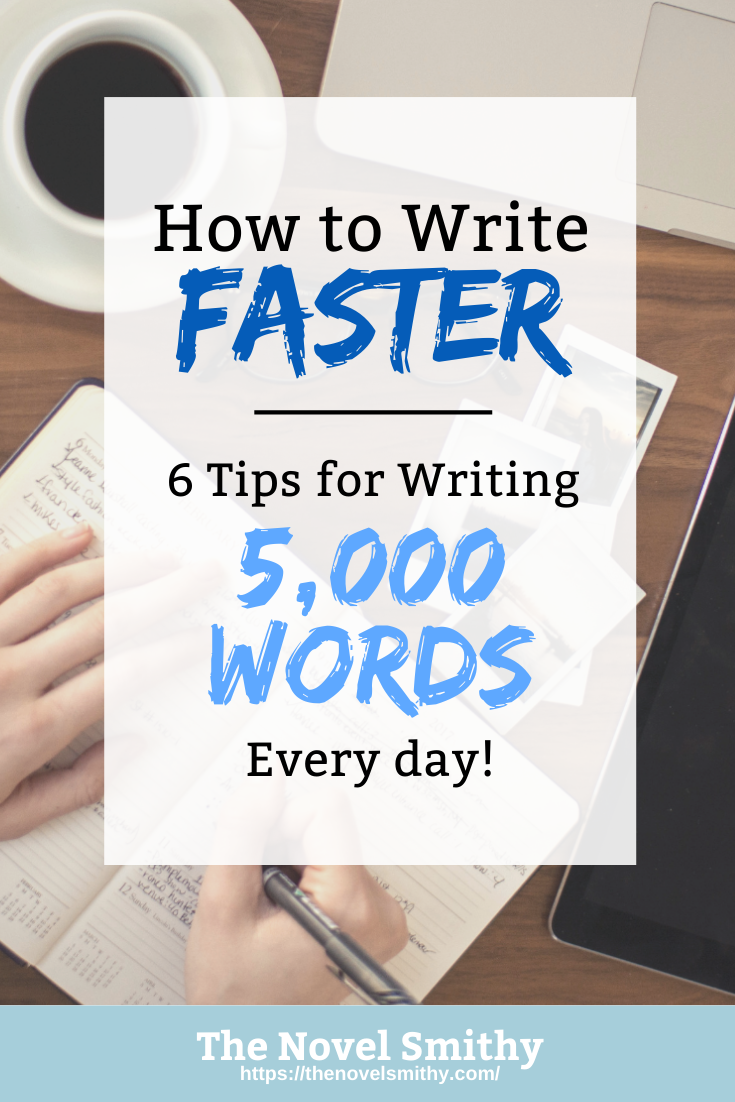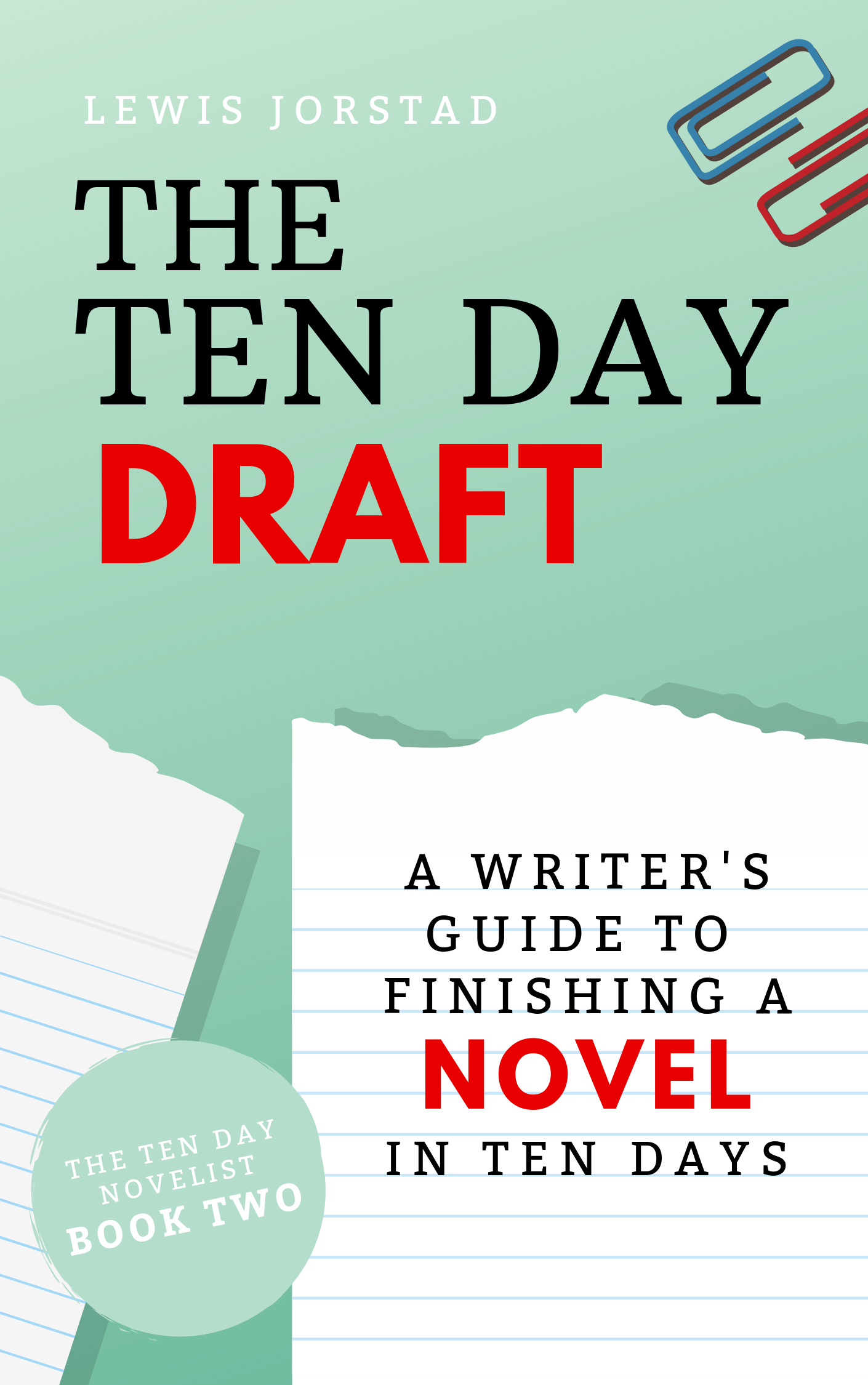Write Faster: How to Write 5,000 Words per Day
“Is it even possible?”
Whenever I tell people that The Ten Day Draft will help them write the first draft of their novel in only ten days, I almost always get the same reaction: surprise, or maybe even confusion. It seems no one believes they can write fast enough to keep up with this quick pace.
However, not only did I complete this process twice myself, but I know of many other writers who write 5,000 words per day every day! Ultimately, there’s no doubt that writing faster is possible—the only question is, will you take the challenge?
_______________________________
This article is based on the first chapter of my second book, The Ten Day Draft.
If you enjoy this post, I hope you’ll check out the full book for specific prompts, step-by-step guidance, advice, and tips for making your first draft a reality—and of course, let me know what you think in the comments below! 🙂
_______________________________
The Case for Writing Faster
Contents
 Many of us spend years or even decades slowly tinkering away at our stories, struggling to bring them to life a few hundred words at a time. Yet, very few writers succeed using this process, and most burn out before their novel is even half complete.
Many of us spend years or even decades slowly tinkering away at our stories, struggling to bring them to life a few hundred words at a time. Yet, very few writers succeed using this process, and most burn out before their novel is even half complete.
After all, it’s difficult to stay motivated when faced with such inconsistent progress.
This is especially true considering how much work and creativity a novel requires.
You need to see your story moving forward. You need a definite end point to work towards, some cohesive vision of your novel to bring to life. Above all, you need a light at the end of the tunnel, and it needs to be getting closer every day.
When you’re only writing two hundred words per day, any progress you’re making is invisible.
Think about it: at that rate, a fifty thousand word novel would take well over eight months. It’s easy to see why your motivation would wane over nearly a year’s worth of work. Fortunately, events like National Novel Writing Month are working to change this. By setting hard deadlines, they push writers to get over their reservations and move past whatever subconscious barriers are preventing them from writing faster.
However, I’d argue events like NaNoWriMo don’t go far enough.
Why not cut to the chase and write 5,000 words per day instead of only 1,667? Why take thirty days, when you could write your novel in ten?
Your Ten Day Writing Challenge
Whether you spread your ten days across a month or complete each day back to back is up to you, but when compared to NaNoWriMo, this ten-day challenge is actually easier to take on.
NaNoWriMo asks you to fit an hour or two of writing into each day, and this is perhaps NaNoWriMo’s greatest weakness. If you miss a day or two, it becomes harder and harder to make up that lost time while keeping up with your daily responsibilities, and easier and easier to lose the motivation to continue.
On the other hand, by only planning to write for ten days, you have a full 2/3rds of the month left for all the other things your life requires. In fact, there are nine days in November that fall on a weekend, meaning you only need to find one other day to dedicate writing! It would seem that, despite asking you to write faster, writing your novel in ten days actually makes the whole process easier.
The key to all of this? It’s completely possible.
While writing The Ten Day Draft, not only did I write the first draft of a novel to test my theories, but I wrote the book itself in only ten days as well. I’m not alone in this either. Tons of other writers write even faster than I do by using a few simple, yet important tricks.
Ultimately, the goal here isn’t to write to exhaustion, but to break through the mental barriers preventing you from becoming a more productive author. After all, to grow and improve as a writer you need to write a lot, which means you need to write fast. So, here’s how I taught myself to write faster, and how you can do the same!
6 Tips for Writing 5,000 Words per Day
Make the Choice:
First and foremost, you can’t write a novel unless you dedicate yourself to the task ahead.
There’s no doubt that this will be a difficult project, at the very least because of how creatively demanding it is. However, that doesn’t mean you shouldn’t give it your all. Think hard about why you’re writing a novel to begin with and record your reasons. What about this story is meaningful to you? What will make it worth the work?
Once you know your “Why,” you can set goals and stick to them.
Pull out your calendar and look at all of your commitments for the next month. Think about what days you’ll have the most time for writing, and which days you’ll feel most productive. Once you’ve found your ten days, mark them in your calendar and treat them like every other appointment, meeting, and class you’ve committed to.
By recognizing why this challenge is important to begin with and then making the choice to stick with it against all odds, you’ll have created your first line of defense when your motivation begins to wane.
Find Your Writing Time:
When will you write?
- For an hour before work?
- During lunch?
- For a few hours before bed?
- Randomly throughout the day?
No matter what your writing schedule looks like, the key here is to pick a time when you’ll both feel productive, and when writing will fit most naturally into your life.
Of course, much like marking your writing days on your calendar, you should treat your writing time as sacred for the next ten days. If a friend invites you to dinner, decline. If your dog demands cuddles exactly when you sit down to write, tell Fido he’ll have to wait a few hours. While saying no is rarely easy, the long-term payoff is worth it. Remind yourself that you only have to keep this up for ten days and then stick to your writing time as much as possible.
Remove All Distractions:
Distractions are the bane of any writer’s existence.
However, this goes deeper than shutting out noise or ignoring other people.
While almost all of us know to find a quiet space to write in, fewer are as diligent about cutting out digital distractions as well. Whether you’re distracted by emails, texts, phone calls, Twitter, or Instagram, you need to cut the Internet and your phone out of your writing routine. Both are deadly time sinks that can sap your writing time away before you even realize it, and they have no place in the next ten days.
Instead of leaving your phone beside you as you write, put it in a drawer in the other room. Turn off your Internet router and unplug the TV. Whatever you have to do to eliminate digital distractions, be ruthless.
Plan Your Story:
Of course, I know many of you will say you need the Internet for “research purposes.” However, research rarely has a place when writing your first draft.
Instead, you should complete any research during the outlining phase.
Outlining your novel is a critical step when you’re trying to write faster, because it prevents you from staring at a blank screen struggling to figure out what happens next. It’s also your chance to research anything you need for your story, all while organizing the various bits and pieces you’ll have to keep track of later on.
I already have quite a few resources about how to outline your novel, so check those out if you don’t have an outline quite yet. There’s still a week and a half until November begins, meaning you have plenty of time to create an outline before your writing challenge begins.
Embrace the First Draft:
Once you know why your story is important to you, have your writing schedule all sorted out, and have an outline ready to go, you’ll have to face by far the hardest aspect of writing a novel—letting go of your inner editor.
You see, first drafts are bad. In fact, not only are they bad, but I’d argue they’re supposed to be bad. Your first draft’s job to get the core ideas of your story onto the page, creating a foundation you can build from as you begin editing later on. They aren’t the time for polished prose and fancy dialog, especially not when you’re trying to write faster.
However, your inner editor doesn’t understand this.
To them, any perceived flaw in your writing (real or not) is a massive problem, one they have to correct before moving on. Unfortunately, your inner editor can often be too sensitive, deeming parts of your story flaws when there’s really nothing wrong with them. This is especially true during your first draft, when your story is in its earliest, most fragile form.
This means that, before you can write faster, you have to embrace the first draft for what it is—rough, unpolished, and ideally free of your inner editor.
Just Write:
Finally, to write faster you need to remember a simple fact:
Inspiration doesn’t proceed action—action proceeds inspiration.
No matter how uninspired or unmotivated you may feel over the next ten days, you have to sit down and write. This is perhaps the biggest reason writing your novel in ten days is so beneficial, because you only have to push past these barriers a few times, rather than struggling against them for months.
Inspiration doesn't proceed action—action proceeds inspiration. #amwriting Share on X
As hard as it may feel in the moment, you’ll be shocked how much easier writing becomes after you give up your subconscious resistance and simply let yourself write. Much like runners hit a runner’s high after pushing past the physical strain of running, writers hit a flow state after they relax into the process of creating their stories.
There’s nothing more magical than this feeling of ease, but you’ll never reach it if you don’t sit down and put words on the page—no matter how hard it may feel at first.
It’s Time to Write Faster
 Ultimately, writing faster is achievable for everyone, and it can be for you too. The key is to prepare yourself for the hurdles ahead, and developing the right mindset is the first step on that journey. I hope you’ll put these six tips into practice in your own writing life.
Ultimately, writing faster is achievable for everyone, and it can be for you too. The key is to prepare yourself for the hurdles ahead, and developing the right mindset is the first step on that journey. I hope you’ll put these six tips into practice in your own writing life.
Or maybe even write your novel in ten days this November!
The Ten Day Draft is officially available, and it’s full of even more advice for managing your mindset and writing faster. It also covers the second half of the picture—storytelling. After all, writing a novel is just as much about understanding the story you’re trying to tell as it is about mindset.
In the end, we’re all capable of bringing our stories to life. We just have to dedicate ourselves to the journey ahead—and perhaps write a bit faster! 🙂



Leave a Reply